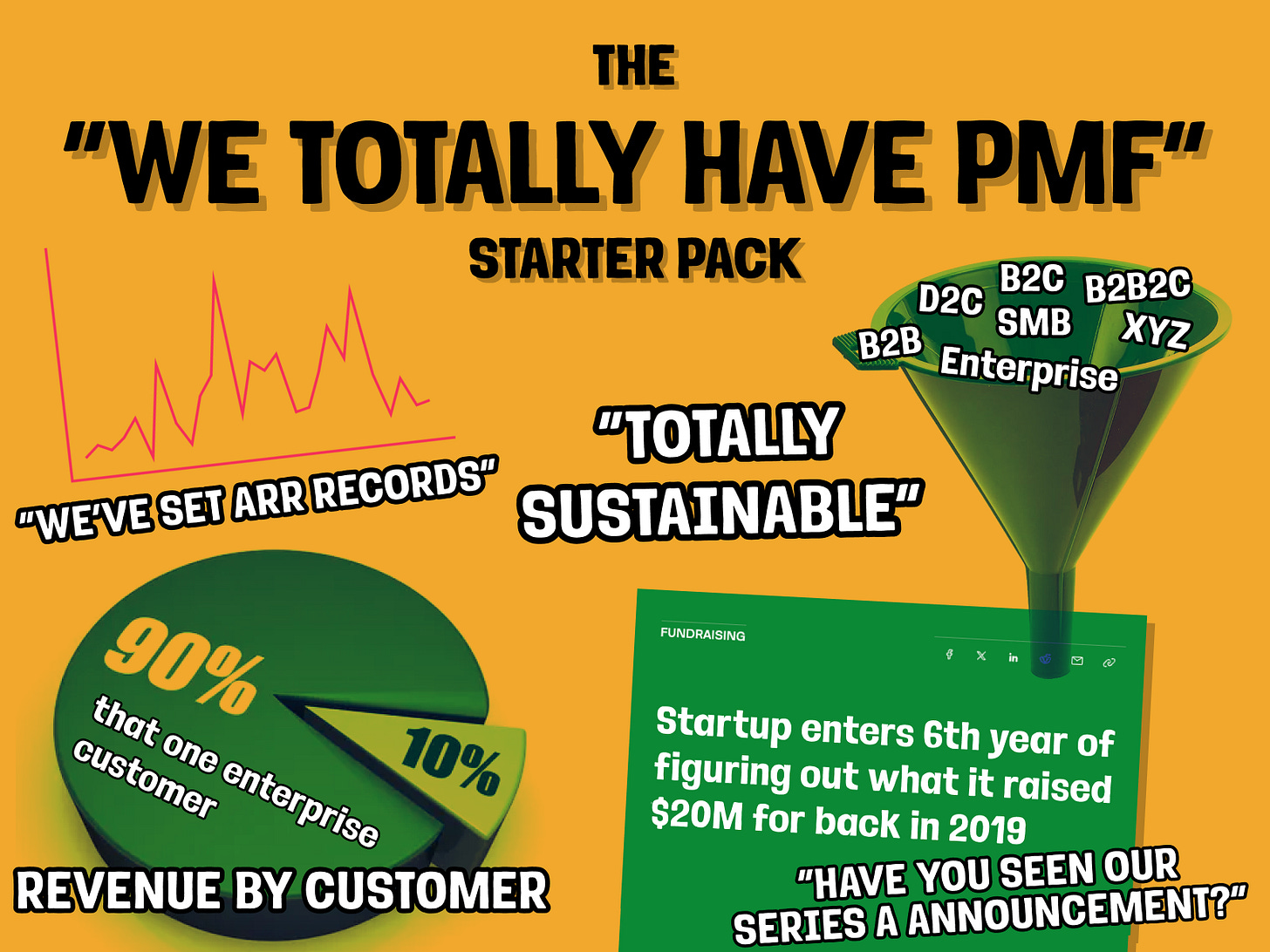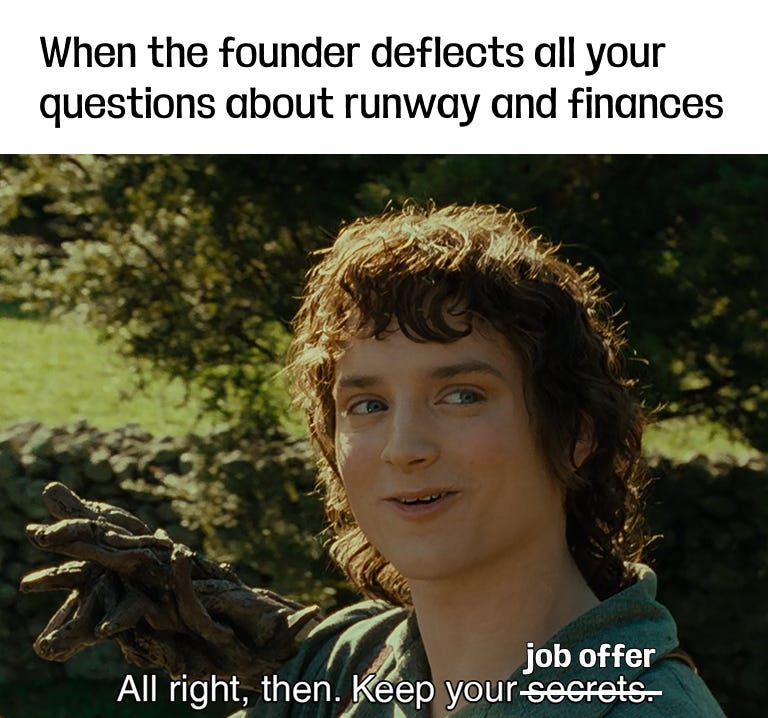Job interview questions engineers should ask (but don't)
...or how to join the right startup and stand out from the crowd
We interview a lot of people at PostHog (around 2,000 in the last 12 months) and two trends stand out:
The candidates who ask really good questions often make it further.
Most still don’t ask us the really tough questions that would be useful for them.
What follows are some questions we wish people would ask us more often. They come with the following caveats:
They’re geared towards interviews at startups with founders. You probably shouldn’t ask a recruiter about product-market fit. Be sensible.
There lots of questions here. Think of them as themes. You don’t have to ask all of them. Prioritize based on what you hear through the process.
They are direct questions. A company that reacts badly to them may not be a good place to work, or you might just be asking the wrong person.
Does the company have product-market fit?
This is the single most important thing a company can do to survive and grow, so you need to figure out if a startup already has it, or how likely they are to get there.
There's an entire internet of writing on how to find product-market fit, and how to measure it, but broadly speaking you need three things:
Non-trivial growth in a specific market.
Meaningful usage after people sign-up.
A flat retention curve showing users are sticking around.
This is sometimes referred to as the product-market fit trifecta.
Don’t just ask "Do you have product-market fit?" Probe the theme.
When interviewing at a very early-stage startup (e.g. one-year-old or less) that is less likely to have product-market fit already, consider questions like:
"What's the problem you're trying to solve?"
"What do you need to do to get to product-market fit?"
"How will you know when you have it?"
"Can you describe your ideal customer?"
It's ok if their answers show they don't have product-market fit yet. These questions are designed to figure out whether they can get there.
Add the following questions to the mix when talking to slightly older startups (e.g. two-years-old or more), who are more likely to have product-market fit:
"Do you ever question if you have product-market fit?"
"When did you reach product-market fit? How did you know?"
"How do you define activation for your product?"
"What's your growth rate?"
Low user growth, or evasiveness on these questions, is a sign they don't have product-market fit.
Some founders will think or say, either intentionally or through self-delusion, that they have it when they don't. The ones that succeed are either:
Honest about not having it and have a plan for getting there.
Have it already and can articulate why they're confident in it.
Avoid startups and founders who:
Can't articulate whether they do or don't have product-market fit.
Don't have a clear plan for how to get there.
Can't explain the signals they're looking for.
Have an unclear hypothesis about their ideal customer profile.
Talk more about their solution than the problem they're solving.
Are hiring like mad despite a lack of product-market fit / growth.
Remember: Not having product-market fit is normal for early-stage startups, so don't be put off by this alone. Your goal is to understand if the company you're applying to is likely to make it or not.
Can the company survive?
Startups that don't have product-market fit will find it hard to raise more money, so it's important they have enough runway (aka money in the bank!) to get there.
This means you need to find out how much runway a company has, and whether their spending is reasonable. You can sum this up in just one question...
"Are you default alive?"
Coined by YC godfather, Paul Graham, being default alive means a company will become profitable before it runs out of money if its current expenses and growth rate remain constant.
Why does this matter so much? Graham sums this up perfectly in his essay:
"If the company is default alive, we can talk about ambitious new things they could do. If it's default dead, we probably need to talk about how to save it. We know the current trajectory ends badly. How can they get off that trajectory?"
Follow-up with questions like:
"What's your runway?"
"What assumptions are you making to calculate this?"
"What are your fundraising plans?"
Any well-prepared founder should be able to answer these.
What constitutes "enough runway" will depend on the company and your attitude to risk. A company that has strong product-market fit and high growth can cope with a shorter runway than one that has neither of these things.
It's important to consider the fundraising environment here, too. Right now, it's much easier to raise money for AI-based products. A capital intensive startup that isn't AI is an extra tough sell unless they already have explosive growth and revenue.
Avoid companies that:
Don't know if they are default alive.
Don't care about it, or what it means.
Are predicting wild increases in revenue within a short timeframe to survive.
Aren't default alive and don't have enough runway to correct course.
Remember: A company that doesn't have product-market fit should, ideally, have lots of money and spend it carefully. Spending a lot and having a big team makes it harder to change direction rapidly, and means the money will run out too fast.
How can you make an impact?
Most candidates will ask questions along this theme, but there are good and bad ways to go about it.
Questions like "What keeps you up at night?" might reveal what the hardest challenge will be, and where you could add the most value if you joined, for example.
In contrast, a question like "What will I be working on?" indicates you're looking for direction. Startups should, for the most part, be looking for people who proactively find and solve problems.
You could also ask:
"What's the hardest problem you're trying to solve right now?
"What problem are you ignoring at the moment?"
"What's the biggest complaint your users have right now?"
Good founders should be talking to users all the time – good engineers should, btw! If they can't instantly articulate what users want, or their biggest pain points, it's a sign they're not doing this enough and are unlikely to succeed.
Remember: Your goal here is find out what they need to solve and whether you can help, and communicate that you're a proactive problem solver. Interviewers remember candidates who ask probing, thoughtful questions here.
How strong is the team?
To evaluate how strong the team is, consider questions like:
"How did you find your earliest hires?"
"How do you attract and retain really strong hires?"
"How do you compensate and reward the team?"
"Do you share board slides with the team?"
You're trying to understand if they view engineering as a cost center (aka a higher chance you'll be miserable there!) or not.
Thoughtful answers about how to hire and pay people indicate this is prioritized. Sharing more information (e.g. board slides) rather than less shows trust.
Avoid founders who instantly talk about the big companies their team came from, rather than the qualities they look for in hires. Unless you're interviewing at OpenAI et al, a large number of ex-FAANG/MAANG people suggests:
The founders are blinded by sparkly CVs full of big names and titles.
They've probably hired a whole bunch of mid-tier people on huge wages.1
Neither are a strong sign of success for a startup.
Remember: If you want to learn in this role, ask yourself: do you believe this company is able to attract people who are as good as or better than you? If not, you might be better off looking elsewhere.
Do they have a winning culture?
Just asking "what's the culture like?" is a low leverage question that will net you broad, vague answers. Instead, ask questions like:
"What are the company values, and why?"
"Can you give me some specific ways you've followed them?"
"Who decides what to build?"
"What does a typical work day look like?"
"What are the things or behaviors that would cause a person in this role to fail?"
You're looking for specific, thoughtful answers that show a level of intentionality here. Avoid companies where:
The founders are obviously dictating everything that gets built.
There's an excess of meetings and processes.
It's obvious no one is thinking about the type of company they want to build.
Remember: Culture eats strategy for breakfast. A winning culture can overcome all sorts of disadvantages. It's also the biggest advantage a startup has over larger, more established competitors. A startup that can't tap into this is likely to fail.
What does the future look like?
It's important to ask founders about their motivations and long-term goals, and whether they align with your own. To do so, ask questions like:
"Why did you start your company?"
"What are you most proud of so far?"
"Do you plan to sell the company?"
Founders who expect to sell their company are likely to make short-term decisions and exit early if they can. This is a valid strategy for many startups, but you should know to expect this before you join.
Follow-up with "What's the company strategy and why?"
You are looking for a simple answer, otherwise the company and the product will end up a mess. In the early days of PostHog, for example, our strategy would be as simple as "Nail X" – e.g. "Nail Self Serve", or "Nail Enterprise Customers".
Even now, five years and 100+ people later, our strategy can be summed up in three easy to understand points:
Be the source of truth for our customers
Build all the tools they need in one platform
Get in first
Finally, early-stage companies often fall apart because the founders break up, so I'd recommend asking: "How do you and the other founders avoid falling out?" See How to not break up with your cofounder for what to look for here.
Remember: The success of the company over the long run is a product of its vision now. Joining a team that knows where they want to go helps both them and you be successful.
🧠 What we’ve been reading (and writing)
Devtools advice in the age of robots – Danilo Campos
We built an AI envoy, you can too – Danilo Campos
Practical advice for engineers in these troubled times – Sean Goedecke
I tried all (46) AI Coding Agents & IDEs – John Rush
😎 Cool tech jobs
Product Engineers at PostHog
Security Engineer at PostHog
Technical Support Engineer at PostHog
Open Source Engineer at Resend
AI Tooling Engineer at Supabase
Senior Engineer at Zep
Founding Software Engineer at Voker
Full-Stack Growth Engineer at ElevenLabs
Obviously there are lots of very talented people at these companies. The point here isn’t “hiring from MAANG companies is bad” but that startups shouldn’t hire people based mainly on where they worked before.







Love this!! Would love your thoughts on some of my stuff, follow me back I could DM you?